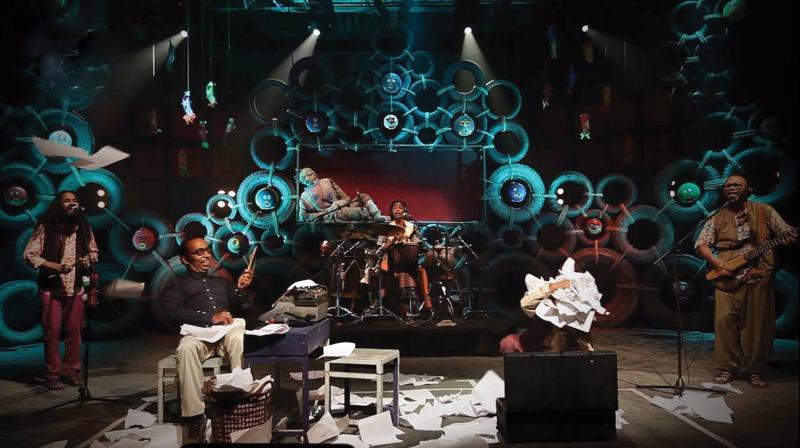Politics of music

Art cannot be seen as a separate entity from society. Any form of art comes under that statement, especially music. Music’s relationship with society and its politics have existed for centuries, sometimes harmoniously and some other times, not as much. Whether it is for lauding the achievements of the State or for taking a stance on social and political issues, music always existed within the system. Music bands across the globe have raised their voice in support or opposing various matters at any given timeline of history. Oorali is probably the most recognisable one among Indian bands who took the initiative to address both happiness and haplessness happening around.
The band has been formed as a collective of actors, musicians, writers and visual artists. Their music, which they call the Oorali experience, incorporates elements of theatre, all the while raising one’s consciousness to the social realities around them.
Well-known for their simple but thought-provoking lyrics and acts along with the performances, the band shot to fame questioning issues like police brutality, identifying and raising voice for the marginalised and atrocities against women. The band’s founding member and guitarist Saji says that Oorali gives a space for musicians to speak up against injustice through their songs. “Music around the world has been changing and unlike in India, foreign bands and music always stood for common men and raised voice against socio-political issues. So, during our band’s inception, we wanted to do something of that sort. Our songs and performances have politics. But that has no links with any political party or ideology. Our politics are love, compassion, and co-existence on this planet. You can see the themes that we use for songs. Love, earth, nature, trees, rivers, emotions, happiness, agony — everything comes under that politics.”
In 2013, a bus was used for the first time in an Indo-Latin collaboration, Las Indias, as a performing space. This inspired Martin, the founder and lead singer of the band, to procure a bus to conceive a different kind of performance space. It was re-engineered into a bus that could open up on one side and behind to become a performing area and be viewed from inside and outside. Since 2014, it has been going places as Oorali Express. “There might be similar endeavours around the world, but as far as India is concerned this is absolutely a new concept which can transcend boundaries of religion, region, and language and share art with all humans,” the band claims.
At the ongoing Kochi-Muziris Biennale, Oorali Express had plans to perform on certain days. But Saji says the band is taking this opportunity to go to a different level by touring to 10 coastal areas in the state and performing for the fishermen community in each area for two days. “The bravery of the fisherfolk was seen during the Kerala floods, and we owe them so much. So, along with Kochi-Muziris Biennale, we are conducting performances at selected coastal areas, showing our gratitude towards them,” says Saji. This project will start by the first week of January.
When the music industry in our country is heavily influenced by film songs and popular culture, bands like Oorali stand out with their commitment towards society.
OoraIi, in their own words, has been finding forms of expression through generations to speak up. Here Oorali is using art to ignite a sense of irony and self-critique. “Oorali cannot stop asking how much is too much. What do you really need and how is it different from what you want? Who are you and where do you come from? Is there an absolute truth or is it all relative? When people dance, when a play touches us deeply, when a song brings tears to our eyes, when a writer moves us profoundly we are all transcending barriers. Oorali wishes to share that joy, the little things that liberate us. Oorali’s rhythm section belongs to the world,” they share.

